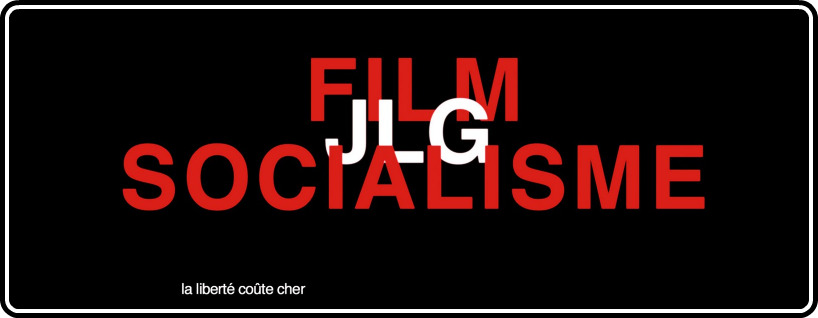Confrontational. Pretentious. Incomprehensible. Pointless. All of these words, and a few choice other ones that don’t fit well within the confines of a film review, have been used to not only describe director and cinematic icon Jean-Luc Godard, but for much of his career they have been the responses had by those who subject themselves to a new work from the auteur’s auteur.
Case in point, ‘˜Film Socialisme.’ One of the biggest lightning rods the film world has seen in quite some time, the film not only found itself a boat load of venom from a cavalcade of writers, but one went as far as to call for the director to hang it up, and end his career entirely.
And for the most part, they are all wrong.
‘˜Film Socialisme,’ for lack of a better collection of words, is utterly plot-free. Broken up into three, what we can call movements, the film features a cast of characters aboard a cruise liner, a woman looking to run for the presidency in France, and a series of stops made by the cruise liner in places like Odessa And Naples. Using a diverse series of narrative styles or forms, the film itself seems as structurally audacious as it is intellectually, or as anything Godard has shot in many a year.
Discussing topics ranging from the treatment of Jews to piracy, ‘˜Socialisme’ feels like the work of a mind spewing anything and everything onto a canvas, with the only intention being to spark its witness to argue with those next to him or her, or come to terms with an idea they haven’t been privy to. With a subtitle track in what has been called Godard’s ‘˜Navajo’ language, the film is intentionally confrontational, but like much of Godard’s latest work (I’m looking directly at you, you masterpiece of a film ‘˜Notre Musique’) it isn’t without its message. Whatever the hell that message may be.
Cinematically, Godard has always been a filmmaker tougher than most to truly critique. Save for obvious classics like the pair of ‘˜Breathless’ and ‘˜A Woman Is A Woman,’ the auteur’s career has been full of pieces that have seemed to me pieces of performance art more than they are films. Being his most dense and thought provoking film since arguably ‘˜Le Gai Saviour,’ ‘˜Socialisme’ is nearly impossible to critique cinematically.
Yes, the film is the most visually striking work of Godard’s career to this point. The film lacks the kinetic nature of his early work, but what it has in spades is this sense of scope that his early work seemed to lack. With verbose shots of oceans or entire blocks of land, ‘˜Socialisme’ is able to strike an intriguing cord by pairing these broad shots with deeply intimate monologues given by his cast of characters. Without this playful sense of energy as seen in much of his earlier works, you get a feeling that this filmmaker is one more assured in his message, and the intention behind it is far less playful than even something as off kilter, yet charming, as the soon-to-be-added-to-Criterion release ‘˜Weekend.’
Performance wise, the film is almost non-existent. No character here is asked to do anything other than preach their respective gospels to the screen, and while the cast here is fine and interesting, including an engaging Patti Smith, the film lacks any true character arcs or anything remotely resembling an emotional center. However, how many pieces in Godard’s career have? Going into this film looking for a piece of plain cinema will leave one absolutely despising this film.
Going into it like one would go into an op-ed in the New York Times, however, may give you an eye opening experience.
At first glance, ‘˜Film Socialisme,’ seems as scatterbrained as a ferret on crystal meth, and just about as interesting. That said, taking into account everything given with its nearly 100 minute runtime, one can get to the point of this film, simply by looking at its subtitles. As mentioned above, the film features a subtitle track in what is known as Godard’s ‘Navajo’ English, which itself is best described as a type of broken English. This lack of true context and any sort of relation to the conversations going on on screen leave this writer to imagine that there is only one way to look at this film. And that way will be deemed by only the viewer during his or her viewing of the film. In this, I mean that frankly, this film can mean a cavalcade of things to a cavalcade of people.
Given Godard’s recent despise for those trying to combat piracy (he’s gone as far as to donate money to those who have been arrested for pirating MP3s), it would be fitting that this generation’s Godard would make a film that could mean a number of things, and exists solely to mean whatever the viewer wants it to mean. Toss in Godard’s usual musings on the economy, war and basic human nature, ‘˜Film Socialisme’ plays more like a summary of Godard’s ideology than anything resembling an obituary. Here’s to hoping we can get more films this thought provoking from one of the cinema’s greatest provocateurs.
The release comes with a trailer and an optional, but wholly unnecessary, subtitle translation of the entire piece.





![Bergman Island (The Criterion Collection) [Blu-ray]](https://criterioncast.com/wp-content/uploads/2022/11/bergman-island-the-criterion-collection-blu-ray-400x496.jpg)
![This Is Not a Burial, It’s a Resurrection (The Criterion Collection) [Blu-ray]](https://criterioncast.com/wp-content/uploads/2022/11/this-is-not-a-burial-its-a-resurrection-the-criterion-collection-blu-ray-400x496.jpg)
![Lars von Trier's Europe Trilogy (The Criterion Collection) [The Element of Crime/Epidemic/Europa] [Blu-ray]](https://criterioncast.com/wp-content/uploads/2022/11/lars-von-triers-europe-trilogy-the-criterion-collection-the-element-of-400x496.jpg)
![Imitation of Life (The Criterion Collection) [Blu-ray]](https://criterioncast.com/wp-content/uploads/2022/11/imitation-of-life-the-criterion-collection-blu-ray-400x496.jpg)
![The Adventures of Baron Munchausen (The Criterion Collection) [4K UHD]](https://criterioncast.com/wp-content/uploads/2022/11/the-adventures-of-baron-munchausen-the-criterion-collection-4k-uhd-400x496.jpg)
![Cooley High [Criterion Collection] [Blu-ray] [1975]](https://criterioncast.com/wp-content/uploads/2022/11/cooley-high-criterion-collection-blu-ray-1975-400x496.jpg)
1 comment